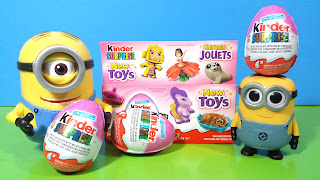Child’s choice of a
chocolate depends on whether there is a toy that comes with it or not. There
are two brands which have a toy inside and which we can compare. Cadbury's
Jems &Kinder
Surprise (Titus, 2010). With time, Cadbury's has become less popular (Titus, 2010). Why? Because the toy that was inside, repeated,
which means that a child got the same toy at least second time in a row. Kinder
Surprise, most usually has a different tactic, where at the end you have the
least number of the same toys.
What keeps us hooked on a product is a sense of
anticipation. Brands that can promise us surprises are the ones that grab our
attention the most.
For more than 40 years already, Kinder Surprise is
maintaining its leader position. What else helps it to sustain and what can
make the product fall?
Social external factors largely influence Ferrero business. The main factor is the current trend of
'snacking' (UKessays, 2015) . Indeed, the number of people eating on
the go is increasing over the years. This can be a strong advantage for growth not
only for the product, but for the whole company.
Kinder Surprise is targeted on the young audience with children, who
will have an impact on their parents' decision making process (UKessays, 2015) . Thus, any social change outside Ferrero
has a possible impact on the new strategy. If for instance, the birth rate
falls, Kinder Surprise won’t bring as much profit to the company as it does now.
Likewise, Ferrero gets less in those countries where the birth rate is low
rather than of the high birth rate countries. If the birth rate increases we
can assume a larger demand for the young population (UKessays, 2015) .
More than
that, increasing obesity is a problem. Numerous studies announced that diet
trend increases, and will even more in the near future (UKessays, 2015) . This means that the demand for Kinder
Surprise will decrease; people will prefer fruits to chocolate.

Fashion
is a contemporaneous factor that changes customers' mind and tastes (UKessays, 2015) . Ferrero constantly
has to adapt adverts and promotions in order to keep catching customers'
attention.
There are several
family life cycle to which you can assign your product in particular. There can
be more to one. It determines the type of family the target market consumer
belongs to (Marketing teacher, n.d.) .
·
Young and single
– not the very targeted group but still there are many people on this stage who
buy Kinder Surprise, because sometimes they want to remember their childhood or
just do it for fun.
·
Engaged couples – not likely to be a target group as there are
no children. Engaged couples buy products to begin a life together and the
recently divorced are buying products that they already had and now need to
replace (Marketing teacher, n.d.) .
·
DINKS (Double
Income No Kids) – not likely to be a target group as there are no children
·
SINKS (Single
Income No Kids) – not likely to be a target group as there are no children
·
Married with
children: Babies, Toddlers, Teens, Older – the main target group Kinder
Surprise as a product is oriented to. Those who buy the product are usually
people aged 18-35, because they buy it for their young children,
sisters/brother etc.
·
Single parents –
same as the one above, it is the main group of the product orientation.
·
Empty nester –
someone whose children
are now grown adults and have moved out of the house (Marketing teacher, n.d.) . It can be another
target market if those grown adults already have children.
What type of consumer buying behavior is most likely to
exist for Kinder Surprise?
1.
Impulse Purchases (happens when a customer stands at
the cashier next to little low-priced products such as gums and chocolates and adds
one of the items to his groceries cart) (Brookins, 2016) . The consumer makes a purchase with
little to no thought or planning involved.
2.
Routine Purchases
(when there are items consumers are used to purchase every day, once a week or
monthly (Marketing teacher, n.d.) . Customers spend
little time purchasing this item and don't typically need to read reviews before
buying the product). Kinder can be bought with a routine purchase, as in some
families there are family rules of a parent buying a child Kinder when coming from
work every day, etc.


No comments:
Post a Comment